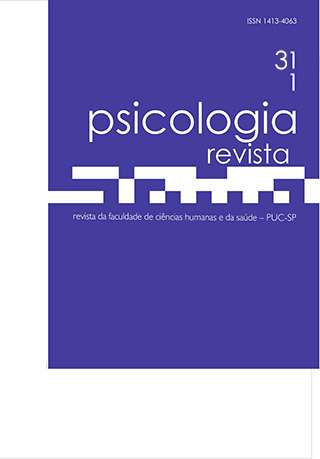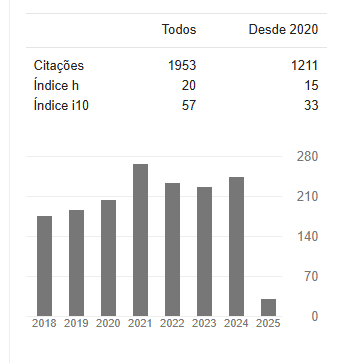Impacto das Teorias da Conspiração em tempos de COVID-19
Uma Revisão da Literatura
DOI:
https://doi.org/10.23925/2594-3871.2022v31i1p51-66Palavras-chave:
Impacto, crenças, teorias da conspiração, pandemia, COVID-19Resumo
Na conjuntura atual, a COVID- 19 representa uma séria ameaça ao bem-estar físico e psicológico da comunidade global. Por se tratar de um vírus com elevado potencial de transmissão, as orientações da Organização Mundial de Saúde para reduzir sua proliferação envolvem medidas sanitárias e ações de isolamento social. Dentre os aspectos de cunho psicológico que podem afetar as decisões de conformidade com as ações de isolamento social, pode-se considerar a crença em teorias da conspiração. Considerando a influência que tais teorias exercem sobre o comportamento das pessoas, o presente artigo teórico teve como objetivo delinear o panorama vigente sobre o estudo das crenças em teorias da conspiração no contexto da pandemia da COVID-19, bem como discutir o impacto que as mesmas exercem sobre a saúde e a conduta dos indivíduos. Em suma, este trabalho fornece subsídios para a ampliação dessa discussão a nível teórico e para o desenvolvimento de estudos empíricos considerando a realidade brasileira.
Referências
Allington, D., & Dhavan, N. (2020). The relationship between conspiracy beliefs and compliance with public health guidance with regard to COVID-19. London: Centre for Countering Digital Hate. Recuperado de https://kclpure.kcl.ac.uk/portal/en/publications/the-relationship-between-conspiracy-beliefs-and-compliance-with-public-health-guidance-with-regard-to-covid19(734ca397-6a4d-4208-bc1a-f3da12f04628).html
Bogart, L. M., & Thorburn, S. (2006). Relationship of African Americans’ sociodemographic characteristics to belief in conspiracies about HIV/AIDS and birth control. Journal of the National Medical Association, 98, 1-7.
Carey, J. M., Chi, V., Flynn, D. J., Nyhan, B., & Zeitzoff, T. (2020). The effects of corrective information about disease epidemics and outbreaks: Evidence from Zika and yellow fever in Brazil. Science Advances, 6, 1-10.
Chen, L., Zhang, Y., Young, R., Wu, X., & Zhu, G. (2020). Effects of Vaccine-related Conspiracy Theories on Chinese Young Adults’ Perceptions of the HPV Vaccine: An Experimental Study. Health Communication, 1, 1-11.
Douglas, K. M., Sutton, R. M., & Cichocka, A. (2017). The psychology of conspiracy theories. Current Directions in Psychological Science, 26, 538-542.
Douglas, K. M., Uscinski, J. E., Sutton, R. M., Cichocka, A., Nefes, T., Ang, C. S., & Deravi, F. (2019). Understanding Conspiracy Theories. Political Psychology, 40(S1), 3-35.
Geldsetzer, P. (2020). Knowledge and perceptions of coronavirus disease 2019 among the general public in the United States and the United Kingdom: A cross-sectional online survey. MedRxiv, 1, 1-27.
Goreis, A., & Voracek, M. (2019). A systematic review and meta-analysis of psychological research on conspiracy beliefs: Field characteristics, measurement instruments, and associations with personality traits. Frontiers in psychology, 10, 1-13.
Jolley, D., Douglas, K. M., & Sutton, R. M. (2018). Blaming a few bad apples to save a threatened barrel: The system‐justifying function of conspiracy theories. Political Psychology, 39, 465-478.
Jornal O Globo [12 de junho de 2020]. Brasil ultrapassa Reino Unido e se torna o segundo país com mais mortes por Covid-19. Recuperado de https://oglobo.globo.com/sociedade/brasil-ultrapassa-reino-unido-se-torna-segundo-pais-com-mais-mortes-por-covid-19-1-24476468
Landrum, A. R., & Olshansky, A. (2019). The role of conspiracy mentality in denial of science and susceptibility to viral deception about science. Politics and the Life Sciences, 38, 193-209.
Pennycook, G., McPhetres, J., Zhang, Y., & Rand, D. G. (2020). Fighting COVID-19 misinformation on social media: Experimental evidence for a scalable accuracy nudge intervention. Psychological Science, 31, 770-780.
Plohl, N., & Musil, B. (2020). Modeling compliance with COVID-19 prevention guidelines: The critical role of trust in science. Psychology, Health & Medicine, 26, 1-12.
Pummerer, L., & Sassenberg, K. (2020). Conspiracy theories in times of crisis and their societal effects: Case “corona” [Preprint]. Recuperado de https://psyarxiv.com/y5grn/
Rezende, A. T., Silva, F. M. D. S. M., Ribeiro, M. G. C., Loureto, G. D. L., Silva, N, O. F. D., & Gouveia, V. V. (2019). Teorias da conspiração: significados em contexto brasileiro. Estudos de Psicologia (Campinas), 36, 1-12.
Sallam, M., Dababseh, D., Yaseen, A., Al-Haidar, A., Ababneh, N. A., Bakri, F. G., & Mahafzah, A. (2020). Conspiracy beliefs are associated with lower knowledge and higher anxiety levels regarding COVID-19 among students at the University of Jordan. International Journal of Environmental Research and Public Health, 17, 4915.
Sher, L. (2020). The impact of the COVID-19 pandemic on suicide rates. QJM: Monthly Journal of the Association of Physicians, 113(10), 707–712.
Šrol, J., Mikušková, E. B., & Cavojova, V. (2020). When we are worried, what are we thinking? Anxiety, lack of control, and conspiracy beliefs amidst the COVID-19 pandemic [Preprint], 1-24. Recuperado de https://psyarxiv.com/f9e6p/
Swami, V., & Barron, D. (2020). Analytic thinking, rejection of coronavirus (covid-19) conspiracy theories, and compliance with mandated social distancing: direct and indirect relationships in a nationally representative sample of adults in the United Kingdom [Preprint]. 1-32. Recuperado de https://osf.io/nmx9w
Torales, J., O’Higgins, M., Castaldelli-Maia, J. M., & Ventriglio, A. (2020). The outbreak of COVID-19 coronavirus and its impact on global mental health. International Journal of Social Psychiatry, 66, 317-320.
Van Prooijen, J. W., & Van Vugt, M. (2018). Conspiracy theories: Evolved functions and psychological mechanisms. Perspectives on Psychological Science, 13, 770-788.
Wise, T., Zbozinek, T., Michelini, G., Hagan, C. C., & Mobbs, D. (2020). Changes in risk perception and protective behavior during the first week of the COVID-19 pandemic in the United States. Royal Society Open Science, 7, 1-13.
Downloads
Publicado
Como Citar
Edição
Seção
Licença
Copyright (c) 2022 Alessandro Teixeira Rezende, Jailson Santana Carneiro, Ana Karla Silva Soares, Camilla Vieira de Figueiredo, Hysla Magalhães de Moura

Este trabalho está licenciado sob uma licença Creative Commons Attribution 4.0 International License.














